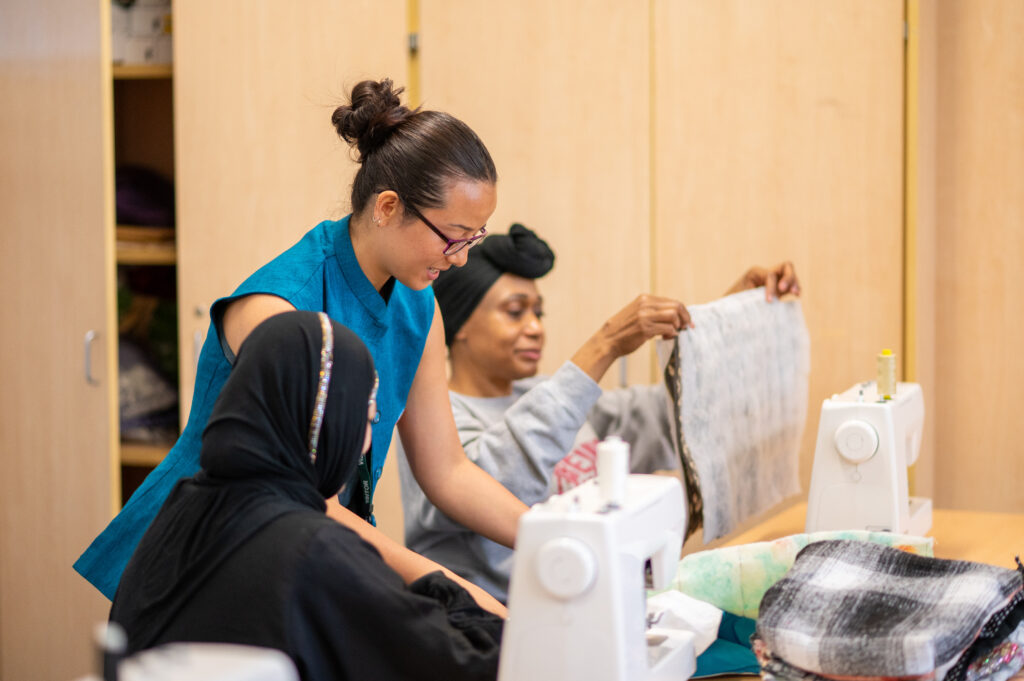
A Chief Executive’s perspective: Using a loan to centralise services
Watford Mencap was operating out of various sites, one of which was very run down. In order to bring all the services together in one place, the charity needed to buy a larger property – not easy in a small borough within commuting distance of London.
We spoke to Jane Pattinson, Chief Executive of Watford Mencap, to find out how the charity achieved its ambition and why it chose Charity Bank for its £1.04m loan.
Why did you decide you needed a new community hub?
We’ve leased our current children’s venue from Watford Council for around 20 years, and it was only supposed to be a temporary situation! The building has really deteriorated. We have a short-term licence arrangement, which has always felt a bit insecure. We also wanted our children’s services, adult services and offices to be together in one hub.
And why did you choose this particular property?
We were going to build a brand-new building through Watford Council. We would have paid the build costs and had a peppercorn rent arrangement, but we wouldn’t have actually owned the property. Then last summer, the council alerted us to this site that was becoming available to buy. We went for a look around, and we loved it.
This new venue is right in the heart of the community. There’s a large garden for the children to play in, much more space and much more peace. Our current building is by a busy road so there’s pollution, noise, traffic and safety concerns.
Our children can get very anxious and distressed, so having that open space to be able to play and run in, and that sense of freedom, will be really helpful for them.
Could you have bought the building without loan finance?
No. We thought about it long and hard. We own two residential care homes and a number of other properties, so we’re not new to property, but this is the first time we’ve taken out a loan of this size. And actually, particularly with the uncertainty over the last year, it’s been quite nice having finance. It’s felt quite secure. With Charity Bank, we had somebody with us, on our side. We weren’t going it alone.
Why did you choose Charity Bank for your loan?
I’d been to various presentations and funding exhibitions where I’d met people from Charity Bank and been able to talk to them.
When we decided we wanted a loan, back when we were looking at a peppercorn lease, I contacted Charity Bank and a couple of other ethical banking institutions.
I struck up a nice relationship right from the start with Lee from Charity Bank. He came out to meet with our operations manager, finance manager and myself. He explained the process to us in a very easy, very simple way, which I think gave us all a bit of confidence that we could possibly do this.
We were also talking to the high street bank that we’ve worked with for a number of years. And the differences became really apparent. The high street bank was really struggling to understand us and what we wanted. I felt I was having to explain everything over and over again, to a range of different people within the bank, who would then go away and talk to other people, and nobody could give me an answer.
Whereas with Lee, he came back to me and answered all of my questions. And it felt really positive without any pressure. It was all about what we wanted to achieve as an organisation.
My trustees, rightly, wanted to make sure we were choosing the right provider. So, I created a matrix that compared different lenders using various criteria, including charges, commitments, what money we’d need to put to one side, requirements around the business plan, each lender’s ethical stance and so on. And we also considered aspects like how quickly people responded to us, whether we felt they were on the same page as us and how easy we thought an organisation would be to work with.
We ended up with two lenders on the shortlist. We invited Lee to come out to meet our trustees and audit & finance committee for a question-and-answer session. His manner, approach and ‘down-to-earthness’ was really appreciated.
We analysed the interest rates, the terms and so on. We went back and forth quite a lot because the trustees wanted to make sure they had all the information. And that didn’t seem to bother anyone at Charity Bank; they were very responsive.
Did it help that Charity Bank understands the sector?
Yes. They said to me later that we were very similar to many other organisations they work with. But to the high street banks, we did seem a bit different. And those banks weren’t prepared to put the time in to gain that understanding. All the way through, we’ve felt that Lee and Charity Bank are with us.
Was it an issue when you changed from wanting a loan to build a new property to wanting to buy and renovate an existing site?
I just rang Lee up. And he said to me, “Oh, that sounds really good. Can I come to see it with you?” And he did. I brought somebody from Watford Council and my chairman along as well. It felt like Lee was a colleague who worked with us – just part of the group of people that made this happen. And I think having him there was reassuring for my trustees as well. And then when we got further down the line, Lisa from Charity Bank really helped us with the paperwork. It was not my forte, so I had a lot of questions, but she didn’t seem to mind at all. She would just tell me, step by step, what I needed to do next, what needed to be signed by who and so on. Charity Bank were with us every step of the way.
I believe it was a back-to-back transaction with Watford Borough Council and Hertfordshire Community NHS Trust. How did that work?
The building had been a children’s respite unit owned by the NHS Community Trust. The respite closed around two years ago, and the property had been vacant ever since. It’s a hugely desirable building, which many developers within the area have been watching for the last couple of years. And I don’t think we would ever have got it without the support we received from the NHS and Watford Council. It didn’t have residential permission and was locally listed, but a developer may have wanted to take a chance on it. Instead, the NHS agreed to sell the building to Watford Council. And then the council would immediately sell the building to us. So the building was valued and the terms of the sale were agreed. We couldn’t exchange in advance, we had to do it all as one continuous transaction.
Did you come up against any challenges?
We thought we were going to complete in September, then January, then February. And then the completion date got put back to the first of April, completely out of the blue. I was straight on the phone to Charity Bank and they just said to me, “That’s why we build in contingencies.” They took it in their stride and reassured me that, actually, it was fine. And the delayed completion date ended up working better for everybody in the end.
Were you worried about taking such a big step during the COVID-19 pandemic?
We’ve continued to provide all of our services through the COVID-19 pandemic. Nobody knew (and we still don’t know completely) what’s around the corner. But because our children’s services building is reaching its ‘end of life’, we had to do something. So that spurred us on.
We started renting our current offices about eight years ago, and then we bought them five years ago. And they’ve proved to be a really sound investment for the organisation. We’ve also had a lot of support from existing and new funders throughout the pandemic.
But we did still need to be quite brave to go ahead with the purchase.
Are you selling your old offices now?
Yes. We’ve accepted an offer and are hoping to exchange soon. We’re not sure yet how much of the proceeds will go to paying off the loan. Part of me thinks that if we’re happy and comfortable with the repayments and hopefully coming out the other end of COVID-19, we should use the money to create more services for the people that we’re here to support. I think that’s a debate that our trustees will have.
It’s nice to be in a position where we have that flexibility. And I think that’s one of the attractions of the financing that we got from Charity Bank.
Was the option to pay some of the loan off early one of the reasons you chose Charity Bank?
My trustees were very clear that they wanted to be able to do that. A high street vendor might not be keen for us to pay back early. We checked with Lee and his answer was, “We want it paid back because that means we can support somebody else.”
We debated for a long time about whether we should go for a fixed or variable rate. We decided to stay variable until we’d actually sold our offices and knew exactly how much money we had in the pot. We may also need to renegotiate terms.
Will the money you earn from services cover the loan repayments?
Yes. When we were considering taking out the loan, we made sure we could afford it. We needed to consider what would happen if the current offices didn’t sell. How was our forecast looking? Our trustees and finance manager spent time sorting all of that out and putting a really strong business case together. It meant we could say to the organisation, “Actually, this isn’t scary when you break it down; it feels achievable.” And because we’ve been paying rent for the current children’s venue, that money can now be used to pay the loan. We’re using that money to invest in something that’s ours. That feels good. And being able to rent out space to other organisations to bring in money, that feels good as well.
The building has got to earn money to pay the loan and enable us to deliver more services for the people that we’re here to support. So I suppose it’s making us more sustainable and secure as an organisation.
In what way will it make you more sustainable?
As an organisation, we’ve worked really hard to become more sustainable. We’ve tried to reduce our risk by diversifying our sources of funding; we’ve moved to a mixture of grant and trust funding; we have a variety of services; we have a charity shop and community café; we employ fundraisers. And if this new hub is bringing in more money, that can be reinvested to meet local people’s needs, by helping us to diversify or to expand our services.
A number of clients have their own direct payments. So we have to keep providing things that people want to buy. The new building gives us a much nicer base from which to offer a breadth of different things to our clients, commissioners and social workers.
Plus, as we won’t be scattered throughout the community, we’ll be able to be much slicker with costings and offer better value for money. A nice place to work helps staff retention and encourages people to come to work for you.
And actually, the building represents many of our values in many ways as well. It’s easier for supporters to see the vision and see where the organisation is going.
All of that works together to make us stronger as an organisation.
What other benefits are there to owning the property?
We’ll have a sensory room and a soft play room, and lots of specialist equipment for children. When we’re not using those facilities, a smaller charity is going to hire them. It means that charity won’t have to fundraise to buy its own equipment. So, the new hub is enabling us to work in partnership more and build stronger relationships.
It will also help to bring us together as an organisation because staff and volunteers will all be together. It’ll be easier to communicate and work with each other.
What would you say to another charity that was thinking of taking out a large loan for the first time?
Explore your options. This wouldn’t have been right for us five years ago, but we’re now in a position where we’ve grown and feel reasonably safe and secure.
Make sure your plans fit with your key strategy. And when things get tough, remind yourself why you’re doing this. In our trustee meetings, we always came back to the fact that we genuinely needed a venue for our children’s services in order to deliver on our key aims.
Our architect used to say to me, “Stop looking at the great big picture. Do it step by step.” And I think that was a really good piece of advice, because while the big picture was important, it was at times too big. It felt less stressful and more achievable to break it down into smaller steps.
I also recommend just ringing people up and having a conversation to see what’s possible. And don’t underestimate the amount of time that you need to put into communication. If you can get those relationships right and take your funders, architects, and commissioners on the journey with you, then it makes everything easier. You’re all driving for the same goal.
For us, that first meeting with Charity Bank was really important. We realised quickly that we felt really comfortable with them. It helped that they were interested in us and understood us as an organisation. I do think it’s worth looking at financial providers that share your values. It was good to know that we always had that support there because, while Charity Bank have done this a million times before, it was the first time we’d bought property this way.
Were you able to get any grant funding for the building?
We were able to access a large grant in the middle of COVID-19. It wasn’t linked to the property, but it was a lifesaver and enabled us to think about drawing more money from our reserves to pay a larger deposit.
We did approach various organisations for capital funding, but many had experienced issues where they’d put funding into projects that never actually materialised. So, they said to come back when we had the building and then ask about funding for a sensory room, training facilities and so on.
We’ve now had money in from a trust for the creation of a children’s play space, which covered the cost of combining several small rooms into one large space. Warner Bros. Studios Leavesden are one of our long-term corporate supporters and they have given us specialist advice and money towards the project. We’ve also launched our first crowdfunding campaign and we’re applying for other grants for equipment and so on.
How many people are going to benefit from the new venue?
We currently support over 200 children and young people with learning disabilities. All of those children will come over to the new site to use our holiday play schemes, after school clubs, Lego club and things like that. Watford Mencap also supports around 600 adults with disabilities and their families. They’ll benefit from lots of leisure activities in the community hub – evening clubs, weekend get togethers, coffee mornings and so on. We want people to be able to drop in if they need help or advice and to come along to a social activity if they’re feeling a bit isolated or lonely.
We’ve got available space to rent out to other community groups too. And of course, our volunteers and staff will benefit.
You’ve already done a lot of work on the property, but I know you’ve got more plans in the pipeline…
Yes. It’s got a very large garden, which gives us a lot of options. We’re going to bring our allotment project over. And we’re looking at how we can use the space to provide more services and training opportunities for people with a learning disability. We’ve started with a feasibility study to see whether we could put supported living accommodation on the site. The dream would be to help people who use our services to transition from the family home to supported accommodation and then into their own homes within the community.
For the organisation, this new community hub is something that we’ve worked really, really hard to achieve. And it feels really special. And exciting!
If you need finance to allow your organisation to grow, please call Charity Bank on 01732 441919.
About Charity Bank
Charity Bank is the loans and savings bank owned by and committed to supporting the social sector. Since 2002, we have used our savers’ money to make more than 1400 loans totalling over £605m to housing, education, social care, community and other social purpose organisations.
Nothing in this article constitutes an invitation to engage in investment activity nor is it advice or a recommendation and professional advice should be taken before any course of action is pursued.


